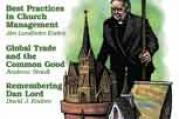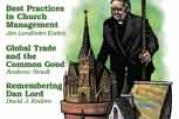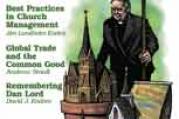Click here if you don’t see subscription options





Surprise Memorial
Many thanks to Robert Ellsberg for his scholarship and recent reflection, Five Years With Dorothy Day (11/21). This remarkable woman, arguably the greatest American Catholic of the 20th century, I include in religious education classes at our Catholic secondary college.
A visit to New York this year afforded me the opportunity to seek out her grave. It took several phone calls to the Catholic Worker to find out the precise location of her resting place. On a sunny Sunday April afternoon, my wife and I drove to Staten Island to pray at the seaside cemetery. Having visited Lincoln’s grave in Springfield, Ill., reflected before the pool-surrounded tomb of Martin Luther King Jr. in Atlanta and often guided family and friends through Arlington Cemetery, I eagerly anticipated the visit to Dorothy’s resting place. Americans brilliantly celebrate in symbol and stone famous people and important events, but memorial was a real surprise.
Upon entering the cemetery grounds we began our search. The Catholic brochure did not mention this famous figure. The attendant at the information center, though initially unsure of the location, finally guided us to her resting place on the side of the road. Her plaque was not different from the hundreds of other plain marble blocks resting on the grass with a simple name and two dates. I was reminded of the difference between the ostentatious Roman tombs of some popes and the elegantly simple resting places of others.
Given her commitment to the poor, the humble plaque is somewhat fitting; but for those who want to visit and pray, could there at least be a sign? It is intriguing that the Catholic community of New York does not seem to celebrate her memory in this place. If I taught in New York, I would take Catholic classes to her grave on pilgrimage.
As my 12th-year students scrutinize her life, I hope some are empowered by her unrivaled story. The works of mercy echo a Gospel call: Care for the sick, help the poor, enlighten and rebuke. I especially appreciate the last maxim, knowing her fearless denunciation of priests, politicians and presidents. We are emboldened by the spirit of great people, and their resting places elicit prayer and encourage Christian action.
Joe Doolan





Lack of Progress
Reading the obituary of the esteemed, recently deceased John F. Long, S.J., (Signs of the Times, 10/10) and the tribute to him in a recent address by Brian E. Daley, S.J., reported in America (Signs of the Times, 11/7), I began to wonder what the results might be of the decades of Catholic-Orthodox dialogue. Little is reported about this.
The few differences in doctrine and practice between the two halves of the church do not appear to a layman to be major obstacles. If the filioque matter is even being discussed, it seems totally irrelevant to the religious lives of ordinary people, and theologians who are concerned with it could do more useful work elsewhere. The Orthodox provisions for married clergy and a second shot at marriage seem far more sensible than Roman Catholic practices and should be adopted by Rome.
I fear the obstacle is power and authority. As Father Daley delicately puts it, For the Catholic Church, growth toward ecumenical unity must unquestionably involve the readiness to accept new forms of synodal decision-making and teaching that will be more complex, more mutual, more inclusive and less centralized than is conceivable within the classical modern model of papal primacy.
In other words, the papacy, which will not even allow a national bishops’ conference to decide the wording of a Bible translation into its national language, has to accept substantial independent decision-making by patriarchs and autocephalous churches! Whoowee! And how is the pope to be elected? The Orthodox have no College of Cardinals, a Roman invention not found in the early church.
Such details could be worked out, of course, given the necessary flexibility on all sides. But the apparent lack of any real progress after decades of work is striking and dismaying.
Tom Farrelly
